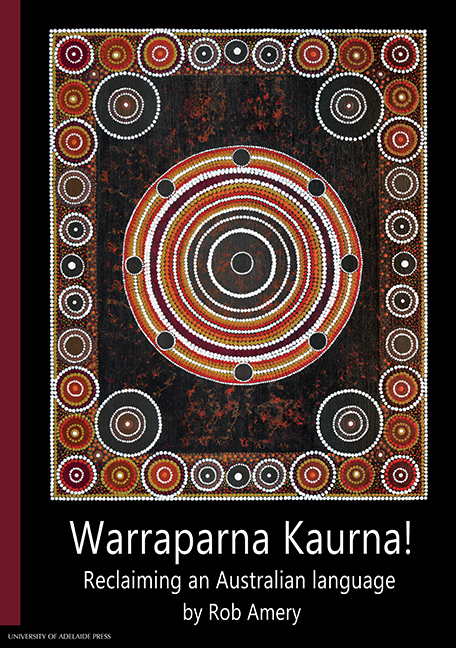Book contents
- Frontmatter
- Contents
- Maps, Plates, Graphs and Tables
- Preface to this Edition (2016)
- Foreword to the 2000 Edition
- Preface to the 2000 Edition
- Acknowledgements
- Abbreviations
- Conventions and Terminology
- Chapter 1 Locating the Study
- Chapter 2 Language Reclamation
- Chapter 3 An Ecological Approach to Language Revival
- Chapter 4 A Sociolinguistic History of Kaurna
- Chapter 5 Kaurna Sources
- Chapter 6 Restoring and Transforming the Kaurna Language
- Chapter 7 Kaurna Language Programs
- Chapter 8 Kaurna in Society
- Chapter 9 Kaurna Language Revival: The Formulaic Method
- Chapter 10 Sociopolitical Dimensions of Kaurna Language Revival
- Chapter 11 Into the Twenty-first Century: Developments since 2000
- Chapter 12 Summary and Conclusions
- Bibliography
- Index
Chapter 11 - Into the Twenty-first Century: Developments since 2000
Published online by Cambridge University Press: 28 July 2017
- Frontmatter
- Contents
- Maps, Plates, Graphs and Tables
- Preface to this Edition (2016)
- Foreword to the 2000 Edition
- Preface to the 2000 Edition
- Acknowledgements
- Abbreviations
- Conventions and Terminology
- Chapter 1 Locating the Study
- Chapter 2 Language Reclamation
- Chapter 3 An Ecological Approach to Language Revival
- Chapter 4 A Sociolinguistic History of Kaurna
- Chapter 5 Kaurna Sources
- Chapter 6 Restoring and Transforming the Kaurna Language
- Chapter 7 Kaurna Language Programs
- Chapter 8 Kaurna in Society
- Chapter 9 Kaurna Language Revival: The Formulaic Method
- Chapter 10 Sociopolitical Dimensions of Kaurna Language Revival
- Chapter 11 Into the Twenty-first Century: Developments since 2000
- Chapter 12 Summary and Conclusions
- Bibliography
- Index
Summary
[P]eople like Jack, Kaiya, Jamie… they can sit there together and have a greatyarn together [in Kaurna], which gives me great pride. They're all young fathersnow, young parents teaching their own language, Kaurna…. They're going tohave something special that we didn't have growing up around Point Pearce orRaukkan [and that] is that background in language. They'll grow up with thatand it'll be second nature to them
(Stephen Gadlabarti Goldsmith, interview with Rob Amery, 3 December 2014)The previous chapters have documented, analysed and discussed the reclamation and the earliest stages of Kaurna language revival. In this chapter I provide a brief snapshot of some of the main developments in the reclaimed Kaurna language and within the Kaurna language movement since 2000. On the one hand, a number of Kaurna people, some of whom played a significant role in the re-introduction of Kaurna, have passed on and others have retired. On the other hand, several young people have become involved and some others have become much more active. Jack Kanya Buckskin began learning Kaurna in mid- 2006 and is now easily the most proficient and fluent Kaurna speaker and the main teacher of the Kaurna language (see Amery & Buckskin, 2012). Non- Aboriginal supporters, too, have come and gone, though there have been some long-term stayers, such as Chester Schultz, who was instrumental in the very first songwriter's workshop in 1990. Chester has been researching Kaurna placenames for KWP since 2007 and completed his own projects Dancing Ngutinai in 2002 and Songs with the Nungas in 2006.
Significantly, I have had the opportunity to travel to Germany several times since 2010 and was able to see the home towns of Teichelmann and Schürmann, the institutions where they undertook their training and the churches in which they, and missionaries Klose and Meyer, were ordained. I have sighted firsthand the correspondence they sent to Germany and the handwritten letters and copybook pages from the Kaurna children Ityamaii, Pitpauwi and Wailtyi. Kaurna representatives, Ngarrpadla Alitya Rigney and Karl Winda Telfer, and Ngarrindjeri woman, Verna Koolmatrie, also had the opportunity to visit the archives of the Dresden Mission Society, now located in the Francke Stiftungs (Francke Foundations) in Halle, near Leipzig.
- Type
- Chapter
- Information
- Warraparna Kaurna!Reclaiming an Australian language, pp. 280 - 294Publisher: The University of Adelaide PressPrint publication year: 2016



